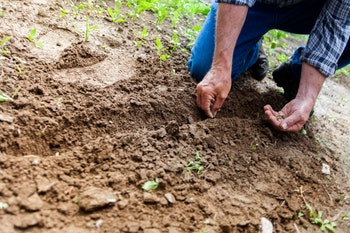Employers and Universities: Work with us?

What are environmental apprenticeships?
If you’re passionate about the environment and love the great outdoors, a career in environmental conservation could be right up your street.
Environmental conservation jobs involve preserving our countryside, landscapes and ecosystems. They protect the health of the planet for future generations.
'If you want to become a pro at future-proofing our planet, consider doing an environmental apprenticeship'
It’s possible to pursue a role in environmental conservation without going to university. In this guide we’ll look at environmental conservation apprenticeships, what skills they require and what kinds of conservation jobs they could lead to.
What are environmental apprenticeships?
An apprenticeship is a training scheme where you work, learn and earn at the same time. You’ll have a workplace, where you develop transferable skills, and you’ll also spend time at a college or training provider, working towards a professional qualification. The set-up means you’ll have the chance to put the knowledge you’re learning at college into practice at work. You’ll also earn an apprentice salary. Learn all about apprenticeships and the different levels.
Environmental conservation apprenticeships train you to protect rural and urban landscapes, plants and

be part of your environmental apprenticeship.
animals, and the countryside. You’ll develop the technical and key skills to enable you to help future-proof the planet. Apprentices gain knowledge and skills through doing.
In fact, organisations in the environmental conservation industry view apprenticeships as a key route into the sector. That’s because they feel that apprentices are equipped with the necessary technical skills.
What are the different types?
There are two types of environmental apprenticeships. At the intermediate level, you would train in roles like ranger, conservation officer, or recycling officer.
And at the advanced level you would train to become an ecologist, recreation officer, senior ranger, education / interpretation officer, or environmental management officer.
What will I learn during an environmental apprenticeship?
Your role and tasks will depend on your employer and the particular apprenticeship you apply for. It could involve preserving landscapes and habitats, or making sure the public have access to parks and green spaces.
Environmental apprentices could be working outside by planting trees, taking wildlife surveys or educating the local community. They learn how to report on the condition of an outdoor area and monitor rivers that are likely to flood.
Educating people is another big part of environmental conservation. You’ll learn how to make people aware of the importance of our environment and natural surroundings. Your goal will be to inspire the public to interact with the countryside and wildlife, and protect it for future generations.
During the apprenticeship, you’ll work towards the Level 2 Diploma in Work Based Environmental Conservation (QCF), which is recognised across the sector.
After the apprenticeship, you’ll be able to apply for conservation jobs in different organisations like the National Trust, parks, wildlife trusts, local councils, and many more.
What skills do I need? Is it right for me?
The great thing about applying to do an apprenticeship is you don’t need a huge amount of prior knowledge of experience. But employers are looking for young people with skills and qualities like these:
- Organised and able to manage your own time.

Encouraging people to enjoy the great outdoors is a key part
of conservation jobs, so great people skills are important. - Great at solving problems.
- Able to adapt to different situations.
- Excellent communication skills.
- Great team-working abilities.
- Able to cope with physically demanding work.
- Good numerical skills.
- Enthusiastic and willing to learn.
- Punctual and reliable.
- Dedicated and committed.
Can I apply?
You’re eligible to apply for environmental conservation apprenticeships if you’re 16 or over and not in full time education. You’ll usually need GCSEs in English and maths at grade 4 or above. Get your search started on the government's Find An Apprenticeship tool.
